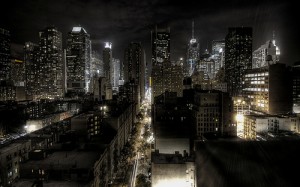The Rabbi of Seventy-Second Street, a kabbalist, wore his hat inside out. He claimed this was not for mystical reasons, but simply so he could show himself to the world as he felt himself to be.
The Rabbi of Seventy-Second Street, when he left his home, which was not often, would stream through the crowds of Broadway as if he were the central float in a parade.
The Rabbi of Seventy-Second Street lived in a fifth floor apartment above a bagel store on the corner of West End Avenue. He claimed the seraphim were close to him there, and he could see the water. He had a river view, so he was certainly right about something.
The Rabbi of Seventy-Second Street, a tall thin man in his youth, had grown to be fat, portly and short. The sad part of it is, he would tell his students, he had hardly reached middle age.
The Rabbi of Seventy-Second Street had no pulpit, no yeshiva tucked away in a dim corner of West End Avenue. No, his students were the birds, the pigeons and the squirrels of Riverside Park. The most wonderful students in the world, he would often tell them.
The Rabbi of Seventy-Second Street lived al one, old before his time. He had lost his family in Europe, although he was not old and certainly had not lived through the Second World War. His spiritual family, he explained, to his students, the woodland creatures of the city. His people.
The Rabbi of Seventy-Second Street ate breakfast at the bagel store below his house each morning. It was not a kosher store, but the Rabbi ignored the patron’s warnings. These bagels are my morning prayers, he said, asking for a little extra cream cheese.
The Rabbi of Seventy-Second Street stared at the Hudson for hours each day. I wonder what it’s like to be a wave, he asked his students. His students wondered the same thing.
The Rabbi of Seventy-Second Street wandered down Broadway, leaving his native home and entering midtown. The people scared and thrilled him. An entire world, he thought, ripe to hear the voice of the Lord. He wrote himself a note, reminding him to tell his students.
The Rabbi of Seventy-Second Street felt alone, sometimes, but not because he was lonely. It was only that seraphim were quiet company.
The Rabbi of Seventy-Second Street wandered to Central Park. But the birds, the pigeons and the squirrels of Central Park were not his students. He had nothing to teach them.
The Rabbi of Seventy-Second Street liked to scream to the heavens, but only in the quiet of his dreams.
The Rabbi of Seventy-Second Street wandered the streets of his dreams. In his dreams, Broadway was a field, and Seventy-Second Street a canal. The City was in Venice, or it was Venice, and the Rabbi was a gondolier. He woke up, sweating, and wondered if the canals would be clean by morning.
The Rabbi of Seventy-Second Street knew no one he could not call his friend.
The Rabbi of Seventy-Second Street knew no one.
The Rabbi of Seventy-Second Street, on one of his strolls through Riverside Park, happened upon a stone. On this stone I build my church, he said, and kicked it away so it became lost among the trees.
The Rabbi of Seventy-Second Street, on one of his strolls through Riverside Park, happened upon a couple playing with their child. I allow happiness in this world, he said to them, but the child was a tree, and the couple were stones, and they ignored his blessing.
The Rabbi of Seventy-Second Street, on one of his strolls through Riverside Park, happened upon a sunset over the Hudson River. I allow beauty in this world, he said, and the sunset thanked him.
The Rabbi of Seventy-Second Street, a kabbalist, wondered on existence. He wrote an epistle, sent it to his people, the birds, the pigeons and the squirrels. And they gathered around the epistle, which was made of nuts and berries. And they ate the epistle, and they spread it to the far corners of the earth, and the Rabbi of Seventy-Second Street was happy.
Bezalel Stern lives in New York. Read more at bezalelstern.tumblr.com.

